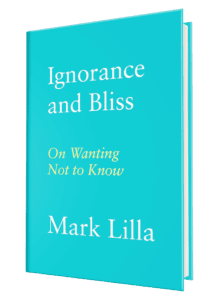
A dazzling exploration of our wish to remain innocent and ignorant—and its consequences.
In Ignorance and Bliss, the acclaimed essayist and historian of ideas Mark Lilla offers an absorbing psychological diagnosis of the human will not to know. With erudition and brio, Lilla ranges from the Book of Genesis and Plato’s dialogues to Sufi parables and Sigmund Freud, revealing the paradoxes of hiding truth from ourselves.
Praise
“A wise and wonderfully enjoyable book. Mark Lilla treats weighty matters with a light touch, in an elegant prose style that crackles with dry wit . . . It is remarkable how many instances Lilla finds of the wriggly measures humankind adopts in order not to look the facts in the face, from the Bible . . . to the enraptured messianism of the twin mid-20th-century ideologies of fascism and communism.” — John Banville, The Guardian
“If a genie offered to tell you the exact year and month and day that you were going to die, you would almost certainly shrink back and refuse the offer. There are things you don’t want to know. In this tour de force, Mark Lilla explores the deep sources of this refusal. An exuberant, inexhaustible storyteller, Lilla finds the hidden, self-protective will to ignorance at the center of our most cherished religious myths, philosophical systems, and literary masterpieces.” —Stephen Greenblatt, author of The Swerve and The Rise and Fall of Adam and Eve
“In this ‘intellectual travelogue,’ Lilla . . . muses on the unavoidable conflicts that arise between the will to knowledge and the will to ignorance . . . This is a book about more than knowledge and ignorance, though. It is also about truth and delusion, certainty and uncertainty, authority and freedom, and dependence and autonomy. Today, when the turn ‘against reason’ and ‘the resistance to knowledge’ are particularly strong, navigating these tensions is even more necessary . . . Lilla is a fluid, perceptive, and engaging essayist, . . . The enjoyment of the book is in experiencing a supple mind and lucid writer.” —Kirkus Reviews
“Ignorance is bliss, a poet once said, and Mark Lilla offers us a learned, humane and astringent guide to our incorrigible attachment to ignorance and our wavering commitment to truth. At a time when our politics is debauched with lies and fake news, Lilla asks a question which challenges our alibis: what if the root of the problem lies not with our leaders, but with us?” —Michael Ignatieff, professor at Central European University and author of On Consolation
“Ever since Aristotle, philosophers have assumed that human beings want to know the truth about the world and themselves. What if this is an illusion? Gleaning insights from ancient myths and modern novels, Saint Augustine, Sigmund Freud, and a rich variety of other thinkers and writers, Mark Lilla argues compellingly that a will to ignorance is as strong in human beings as any interest in knowledge. Writing with admirable clarity and subtle charm, Lilla gives us a highly original study of what our desire not to know means for our lives.” —John Gray, author of The New Leviathans: Thoughts After Liberalism
“Lilla’s conversational foray through a broad array of religious, philosophical, and historical examples produces many surprising, thought-provoking insights . . . This will provide the intellectually curious with more than enough to chew on.” —Publishers Weekly
“In these murky days when we all seem to be at sea, Mark Lilla’s elegant and perceptive handbook serves both as a compass and a hopeful sail.” —Alberto Manguel, author of Maimonides and A History of Reading
![]()